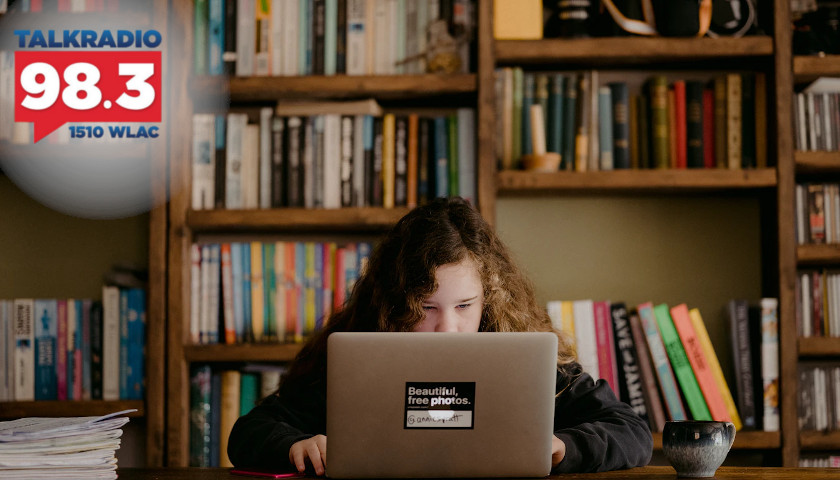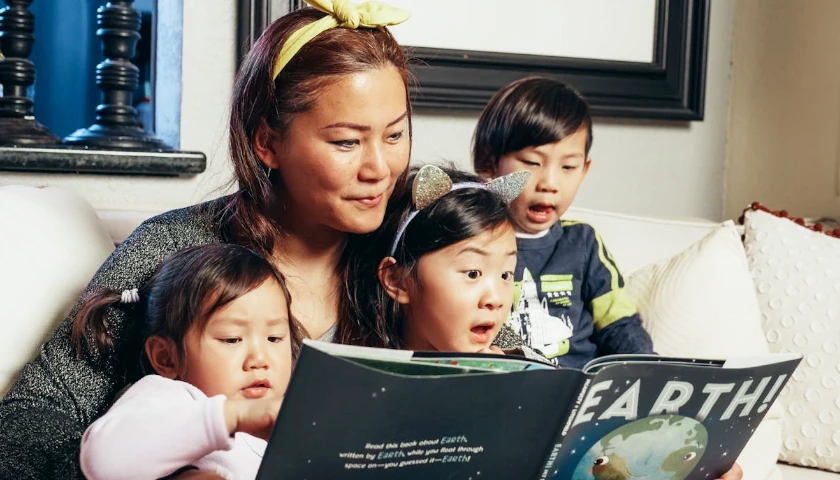Live from Music Row Tuesday morning on The Tennessee Star Report with Michael Patrick Leahy – broadcast on Nashville’s Talk Radio 98.3 and 1510 WLAC weekdays from 5:00 a.m. to 8:00 a.m. – host Leahy welcomed author and an adjunct scholar at the Cato Institute Kerry McDonald to the newsmakers line to discuss her book Unschooled: Raising, Curious, Well Educated Children Outside the Conventional Classroom showing an increase in its popularity post-pandemic.
Leahy: We are joined on our newsmaker line by Kerry McDonald, a senior fellow at the Foundation for Economic Education and author of Unschooled: Raising, Curious, Well Educated Children Outside the Conventional Classroom. Welcome to The Tennessee Star Report, Kerry.
McDonald: Oh, it’s great to be with you this morning, Michael. Thanks.
Leahy: We have a couple of things in common. You are raising your children in Cambridge, Massachusetts. Is that right?
McDonald: That’s right.
Leahy: I know it well went there, went to Harvard as an undergraduate. What part of Cambridge do you live in?
McDonald: We do live right in between Harvard and MIT. And I went to graduate school in education policy at Harvard.
Leahy: Ah ha! I know it well, I know that area very well. It’s warming up a little bit now. The winters get pretty cold there, don’t they?
McDonald: They do. But our daffodils are sprouted. And so it’s starting to feel like spring a bit.
Leahy: I’m also a big fan of the Foundation for Economic Education that was founded back in 1947 by Leonard Read.
McDonald: 1946. Yes, our 76 year anniversary this year.
Leahy: The author of I, Pencil a great 3,000-word essay on how free markets work was Leonard Read. In a tribute to him in 2012, I wrote a little ebook for Harper Collins Broadside Books imprint called I, Light Bulb: A Deathrow Testimonial for the Incandescent Light Bulb.
McDonald: (Chuckles) Yeah, iPencil is the classic essay on spontaneous order and the ways in which free markets help people who’ve never met, who will never meet, who may not speak the same language or share the same values, to come together in mutual cooperation to create the things we want and need.
Leahy: What prompted you to write Unschooled: Raising, Curious, Well-Educated Children Outside the Conventional Classroom?
McDonald: So the book came out in 2019, published by Chicago Review Press. And it was really a way of spotlighting the modern homeschooling movement since its rise in the late 1960s early 1970s starting from the liberal left and the kind of hippie commune of families deciding not to send their kids to school. And then growing throughout the 1980s, particularly with a conservative right and the religious right and then looking at where homeschooling is now with such diversity and such is much more of a mainstream acceptance. And of course, that was 2019.
And then 2020 when all of a sudden schools were shut down as part of the pandemic response, the book sales jumped and more families were interested in knowing how to manage to homeschool and what this would be like. And sure enough, the Census Bureau just coming out a couple of weeks ago with data now showing that the rate of independent homeschooling parents who have unenrolled their children from school for homeschooling has tripled from about three and a half percent before the pandemic, based on federal data to now over 11 percent. So we’re talking over five and a half million students are now being independently homeschooled in the U.S.
Leahy: Do you think that will be a permanent post-pandemic trend?
McDonald: I think we’ll definitely stay elevated whether we stay at the 11 percent mark or not or slip a little bit, I think, is debatable. But I think we will definitely be closer to 10 percent, then closer to three percent because so many parents have realized a few things. One, when schools shut down last bring many families realized what exactly their kids were learning.
They had this close-up view through Zoom school of the curriculum that their kids were being exposed to, maybe what they weren’t learning and what sort of ideological bent they might be seeing in the curriculum. And I think a lot of parents said we can do things better. A lot of parents were thinking about homeschooling for quite some time, but lack that catalyst to make it happen. And then the school shut down provided that.
And then I think the second thing is now, over the course of this academic year, as families have been frustrated with school reopening plans or find remote schooling to be a disaster for their kids, they’ve settled into a sort of a rhythm with homeschooling and realizing that they can live and learn alongside their children with support from so many online resources, as well as community resources to help facilitate their child’s education.
Leahy: I see that Professor Peter Gray of Boston College wrote the forward to your book. We know of him through Lenore Skenazy, the author of Free Range Kids. Sounds like you’ve got a group of sort of intellectuals who support liberty for children and liberty for parents through homeschooling.
McDonald: That’s right. So both Peter Gray and Lenore Skenazy are on the board of Let Grow, which is an organization that really focuses on providing children with more freedom and opportunities for play, things that we sort of took for granted when we were kids because we had so much more able to kind of go out in our neighborhoods and explore without parents always hovering.
And so they’re trying to bring that back in meaningful ways. And then certainly Peter also has his passion. He wrote a book, Free to Learn. So he has a passion for encouraging self-directed education and expanding opportunities for children to learn outside of a conventional classroom.
Leahy: So for our listeners who are right now, considering this, perhaps on the edge of removing their children from K-12 public schools, what would be your best advice for them?
McDonald: I think the first thing is just to realize how many online learning resources are available. So when the pools first shut down last spring, I posted, I’m also an adjunct scholar at the Cato Institute, and I posted on the Cato Institute website a whole list of free online learning resources that parents could take advantage of. There are also many low-cost resources as well. You look at curriculum platforms such as Khan Academy, which is the leader, and free online learning videos for kids used in a lot of classrooms across the country, particularly for their math education resources.
And that’s entirely free to parents, and they’ve really ramped up their resources during the pandemic response to provide lesson plans and all kinds of tips and techniques for families to help them to guide their children’s education. So that would be one thing. There are other resources like outschool.com, which is a low-cost online Zoom learning experience. But it provides customized learning videos and learning topics for kids of all ages, really high-quality stuff there.
So I think that there are just tremendous opportunities for parents to take advantage of these resources and realize that they don’t have to be the ones sitting at home kind of the stereotypical vision of homeschooling families of sitting around the kitchen table with their textbooks all day and going through the process of replicating school at home. And instead of that they really can connect their kids to all kinds of different resources that are available to them.
Leahy: How is it working out with your own kids?
McDonald: So I have four children who have never been schooled. And I will say when the school shut down last spring, I did have a lot of people say, well, things must be the same for you. You must not have experienced any kind of disruption. And nothing could be further from the truth. I often say that our kids spend more time outside of our home than inside. So when we were, like everyone else, forced to be confined into our own homes and disconnected from our larger communities, it was really a challenge, and it continues to be here.
Our library is still closed. Museums are just starting to reopen. A lot of classes and programming for home school kids is still not happening, similar to the lack of schooling resources for other kids. So it has been a challenge. But that’s where I think it’s really remarkable that the impression that the public has for homeschooling has actually become more favorable during school shutdowns.
EdChoice, for example, last April came out with one of the first surveys soon after school closures, finding that more than half of parents said that they had a more favorable view of homeschooling since the pandemic shutdowns. And that’s only increased every month since they’ve done that survey. So even as recently as February, now it’s up to 63 percent of parents say they have a more favorable view of homeschooling than they did prior to the pandemic.
And I say, gosh, if you think this is good homeschooling when still so many things are inaccessible to you, just wait till the real thing when you can really be immersed in those people, places, and things around you.
Leahy: Now in terms of your own life, are you the one responsible in your family for organizing the four kids and teaching them and then doing all your work with Foundation for Economic Education? How do you manage all that?
McDonald: No. My husband and I both work, and we both share the responsibilities of working and guiding our children’s education and connecting them to all kinds of mentors and online learning resources. And when we’re able to, resources in our communities and class programming and so forth. So it’s really a joint effort. And I think again, that’s where the pandemic response has been able to maybe open up homeschooling to more families.
As telecommuting and working from home has become more acceptable, the Brookings Institution came out with a report last summer saying that they expect teleworking will continue long after the pandemic response ends. So I think that as parents have more flexibility in their work schedule, they want to grant that same flexibility to their kids with regard to their education.
Listen to the full first hour here:
– – –
Tune in weekdays from 5:00 – 8:00 a.m. to the Tennessee Star Report with Michael Patrick Leahy on Talk Radio 98.3 FM WLAC 1510. Listen online at iHeart Radio.





